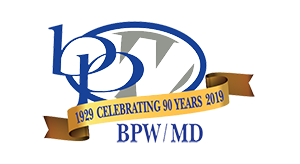
Business and Professional
Women of Maryland
"Women Helping Women Succeed"
1980's &1990's
1980
BPW/USA tackled "comparable worth" by calling for newspapers to stop the occupational segregation in classified ads (clustering of women in a few restricted occupations of low-paying, dead-end jobs). Numerous state and municipal governments revamped their pay scales, recognizing dissimilar jobs may not be identical, but may be comprised of tasks, educational requirements, experience and other characteristics that are equivalent or comparable. In 1986, San Francisco became the first in the nation to approve a pay equity referendum, implementing $34 million in increases for employees in female and minority-dominated jobs.
The "Red Purse Campaign" of 1988 drew national attention to wage disparity. Using the "BPW" letters to represent Better Pay for Women, BPW/USA capitalized on the national media attention focused on the red purse.
At the Hartford, Connecticut Convention in 1985, BPW/USA's Legislative Platform expanded to include the Equal Rights Amendment Preamble. Also at this Convention, BPW/USA initiated the $2.65 million campaign to renovate the national headquarters at 2012 Massachusetts Avenue ("Project 2012").
To underscore the economic inequity women face in their jobs BPW/USA launched its Red Purse Campaign with the theme "Better Pay for Women" in 1987.
1990
Workplace equity issues including sexual harassment, the glass ceiling, health care reform, dependent care, tort reform, increasing the minimum wage, lifetime economic security and pay equity continued to be BPW/USA's targeted issues. Then-Secretary of Labor, Elizabeth Dole, and First Lady Barbara Bush addressed BPW/USA's members at the White House Briefing during the 1990 "Lobby Day" event.
At the Minneapolis, Minnesota 1992 Convention, BPW/PAC announced the first-ever endorsement of a presidential ticket by endorsing Clinton-Gore. BPW/USA's grassroots membership worked as never before in GOTV (Get Out The Vote!) campaigns. From voter education forums, working in candidate campaigns, fundraising for candidates and registering women to vote, 1992 proved to be the "Year of the Woman," electing a record 4 women to the U.S. Senate and an unprecedented 24 women to the House. This political activism continued to the 1996 elections where BPW/USA joined other women's groups endorsing the Women's Vote Project.
Continuing with a focus on workplace issues, BPW/USA lobbied Congress for passage of the Family and Medical Leave Act. After nearly a decade, the FMLA passes in 1993.
Discussions on "comparable worth" are expanded to include enforcement and strengthening of existing Equal Pay legislation. The Pay Equity Employment Act of 1994, followed by the Equal Pay Act (introduced in 1994) and the Paycheck Fairness Act (introduced in 1997) became BPW/USA's focus legislation through the '90s.
1994
Business and Professional Women/USA's (BPW/USA) members lobbied their Members of Congress successfully convincing them to pass the groundbreaking Violence Against Women Act (VAWA), which included millions of dollars in state grants to combat violence against women. The programs created by VAWA have also been successful at providing victims with emergency shelter, hotlines, and supportive services. VAWA also created, for the first time, a civil rights remedy for gender-motivated crimes.
BPW/USA celebrated its 75th anniversary at the 1994 St. Louis, Missouri Convention with Gloria Steinem as the keynote speaker. Also in October 1994, the syndicated cartoon, "Cathy," celebrated National Business Women's Week, one of BPW/USA's Signature Events.
1996-1999
BPW/USA battles attacks on affirmation action throughout the nation: 1996 in California, 1998 in Washington, and 1999 in Florida.
Social Security Reform became a front-burner issue for BPW/USA in 1999 and continues to be an issue BPW/USA follows closely. The wage gap contributes to a $200,000 loss in social security benefits to the average woman.